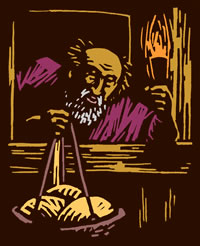
17th Sunday in Ordinary Time Year C
Luke presents the teaching of Jesus concerning prayer having in mind converts like himself. Christians coming from a Jewish background were accustomed to a tradition of daily prayer; Gentile converts, on the other hand, had to acquire a habit of regular prayer; Luke, therefore, stresses perseverance. This gospel may have something to say to us - as the pressures of daily life make regular prayer more difficult. ‘Teach us to pray’. The disciples are not merely asking how to pray; they want to know what should be the content of the prayer that makes them true followers of Jesus. The Lord’s Prayer, as it came to be called, soon had a central place in the Church’s life. It was a badge of membership, a measure of the true Christian spirit. In the early Church, those preparing for Baptism learned the Lord’s Prayer, but they did not join in public recitation until they shared in the celebration of the Eucharist.
In constant use in the Church’s life, this prayer has evolved. We are more familiar with the form it has in Matthew’s gospel (6: 9-13). Luke’s succinct wording, however, makes clear the essentials of the prayer of Jesus. God is addressed as ‘Father’. In a sense this says all. Jesus came that we may know the mercy and generosity of his Father – the Father who is ready to give nothing less than the Holy Spirit to those who ask him. God will be given all honour, and God’s ‘kingdom’, or reign, will certainly come - whether we pray for these things or not. In making these petitions, we are really asking that we - and all who share our world - may play our part in this fulfilment. (One of the Prefaces of the weekday liturgies expresses well the spirit of these petitions: ‘Our prayer of thanksgiving adds nothing to your greatness, but makes us grow in your grace’.) We are encouraged to pray for ‘our daily bread’ – in the ups and downs of life, we can place all our trust in the Father who watches over us. And the prayer ends on a realistic note. We acknowledge our sinfulness, confident that we shall be forgiven - because we have learned the Father’s ways, and are ready ourselves to forgive. Finally, whatever lies ahead, we put ourselves in God’s care.
The insistence of Jesus on perseverance may puzzle us. Clearly, he does not mean that the Father has to be cajoled into granting the favours we ask. He has himself warned against thinking our prayer will be heard because we ‘use many words’ (Mt 6: 7). If, as we plead for what seems important to us, we bring our needs before God in simplicity and faith, and our relationship with the Father will grow and mature. Our prayer will certainly be heard, we have God’s word for it – especially prayer made ‘in the name of Jesus’ (Jn 15:16) – though it may not be answered in the way we first expected.
Jesus tells us that our first prayer should be made to the Father – with whom, of course, he shares all things. It has often been pointed out that, for many Catholics, prayer made directly to the Father is not the familiar practice it should be.
John Thornhill sm

